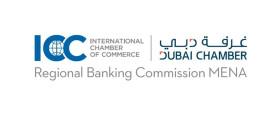 This year’s Sibos conference took place at the Metro Convention Centre in Toronto, Canada, once again gathering banking and financial experts and leaders from around the world to network, conduct business and talk extensively about key industry issues. It was organised by the Society for Worldwide Interbank Financial Telecommunication (SWIFT), operator of the global financial messaging network
This year’s Sibos conference took place at the Metro Convention Centre in Toronto, Canada, once again gathering banking and financial experts and leaders from around the world to network, conduct business and talk extensively about key industry issues. It was organised by the Society for Worldwide Interbank Financial Telecommunication (SWIFT), operator of the global financial messaging network
How to combat fraud
The best strategies and technologies for preventing, detecting and addressing financial fraud were outlined at Sibos, the world’s premier financial services event, by EastNets, a leading global provider of compliance and payments solutions and services.The company delivered a presentation entitled “Emerging Fraud Challenges” on the fourth day of the summit. It covered the latest fraud threats and trends faced by businesses around the world.
“Financial fraud has been growing in complexity over the past few years as criminal elements take advantage of a recovering global economy,” explained Hazem Mulhim, CEO of EastNets. “Sibos is an important platform to identify and promote the best approaches to anti-money laundering and other illegal financial transactions, and we are very eager to present our own detection and prevention solutions in full support of the global fight against fraud during the event. We also want to learn more about the unique challenges faced by financial institutes globally so that we can come up with more effective anti-fraud solutions.”
During its presentation, EastNets described how organised criminal groups travelled throughout Europe, identifying security gaps and targeting new territories. In this respect, it emphasised developments in areas such as hardware and software updates, cross-border co-operation and structured initiatives against fraud.
EastNets also showcased the capabilities of en.SafeWatch Anti-Fraud, a system that provides real-time protection against fraud. The solution accurately detects credit card, wire and internet fraud and can perform real-time blocking actions to protect institutions against losses.
A spokesman said, “It can be easily configured to suit the operational and cost requirements of adopters. The en.SafeWatch Anti-Fraud system is seamlessly integrated with EastNets’ anti-money laundering systems currently used by more than 400 financial institutions in 80 countries.
“EastNets also now features an internal fraud module, looking at employee behaviour within a financial institution. This is equipped with ‘dynamically populating dashboards’ that offer the possibility to monitor and visualise incidents as they happen. It also covers incidents that may happen with a pre-paid portfolio.”
Solutions for change
The launch of BNY Mellon’s most recent update of its research into the changing relationships between local banks and global processing banks was announced at Sibos.
The new research material recaps how the increasingly sophisticated needs of commercial clients in areas such as trade finance, liquidity, global payments and client service are creating a global transaction “ecosystem” with increasingly high levels of interconnection and interdependence. It shows how new relationships with global processing banks can allow local banks to play a positive and distinctive role in the new “ecosystem”.
Since the financial crisis of 2008, BNY Mellon’s treasury services research has focused on the needs of both local banks and their commercial clients to identify new revenue streams, lower their costs and enhance their risk management. Whilst technology is key in all three areas, these challenges have also inspired new business arrangements.
Previous BNY Mellon white papers have shown how constructive collaboration with global processing banks has proven to be an attractive strategic alternative for local banks. However, its 2011 research focuses on how adoption of the manufacturer-distributor model in three key areas of treasury work — trade finance, payments processing and liquidity services — can give local banks the connectivity and client service resources they need to deliver end-to-end solutions in tune with the new transaction “ecosystem”.
“Sibos provided the perfect opportunity for us to share important research findings with others in the new transactional ecosystem,” said Alan Verschoyle-King, global head of sales and client management, BNY Mellon treasury services. “In preparing this year’s material, we decided to make our findings available not just as printed reports. We’ve also prepared a series of videos that summarise and personalise our findings. These feature a representative group of treasury services advisors talking about their experience helping clients succeed in a healthy, growth-oriented transactional ecosystem. The settings for the videos show the beauty of flourishing ecosystems, and provide memorable framing for some very important business concepts.”
The first in this year’s five-part series of videos summarising BNY Mellon’s 2011 treasury services research can be viewed at www.bnymellon.com/treasuryservices/research
Barclays focuses on transactional FX
Barclays is continuing to invest in its transactional FX platform, making it a key priority for 2012.
Transactional FX is where international payments are converted at a point in the payment value chain where the currency conversion benefits the originator bank as well as the beneficiary bank as has traditionally been the case.
A Barclays spokesman said, “This kind of processing system requires constant updates to reflect immediately any changes in payment flows and behaviours. It is handled by a dedicated group of product experts, and we will be adding more functionality and the ability to further fine-tune the processing per originating bank.”
Joerg Pinkernell, head of financial institutions product management, Barclays, said, “There has never been more of a focus on transactional banking, as greater emphasis is placed on maximising revenue sources that are reliable and do not have a major balance sheet requirement. Regulation and competition is only speeding this up.
“Therefore, transactional FX has certainly climbed up the agenda in the past year or two for a growing number of financial institutions as they look to participate in the revenue their clients’ transactions are generating.”
Pinkernell added that Barclays was one of a few “select operators” promoting global transactional FX at Sibos, and it was “generating significant interest across the event”.
Three-in-one from BNP Paribas
BNP Paribas Securities Services has launched a service that allows financial intermediaries to shorten their deployment time to new markets, optimising liquidity and boosting client service.
Delivered through a single point of contact, BNP Paribas’ solution “enables access to robust settlement, clearing and custody services in more than 100 countries, meaning clients benefit from smoother instruction, reporting and reconciliation processes, and faster on-boarding”.
It says that establishing proximity in new markets is key to financial intermediaries wanting to grow their trading activities and capture new business. Yet building the requisite critical mass introduces rising settlement and custody costs by complicating cash management and on-boarding requirements, and the added costs of working with more local agents in each market.
Commenting on the development, Philippe Ruault, head of clearing, settlement and custody products at BNP Paribas Securities Services, said, “In the current climate, the number one concern for financial intermediaries is maintaining their volumes and margins – so anything which can actually boost growth is in very strong demand right now. Our solution removes virtually all of the complexity involved with implementing and managing moves into new markets, thus enabling banks and brokers to react quickly to business opportunities in new territories.”
Eric Roussel, head of trade and market services at BNP Paribas Securities Services, said, “With this critical aspect of their post-trade infrastructure under our management, clients can focus their efforts on their core business activities.”
Mobile payments authority
EastNets, a global provider of compliance and payment solutions, has announced that it has obtained the SWIFTReady–workers remittance conformance label for 2011.
en.MoRe is the first application in the workers’ remittances programme offering a mobile payments functionality between a Telco operator and a receiving bank.
“The SWIFT certification for the en.MoRe mobile remittance solution validates EastNets’ commitment to deliver great-value solutions that satisfy the needs of our customers,” said Hazem Mulkim, CEO, EastNets. “en.MoRe is particularly important in Europe, the Middle East and the Americas as it benefits millions of migrant workers who regularly send remittances to their home countries.
“EastNets will leverage its network of mobile operators globally to allow the maximum number of people to take advantage of this genuinely convenient, fast and secure mobile remittance solution.”
EastNets presented case studies and discussed the impact of “mobile money transfer in changing the developing communities” during its participation at Sibos. Its view is that mobile money is becoming an essential part in the everyday life of people in Africa and Asia, and is considered to be the fastest growing technology after social media.
HSBC thinks flexibility
HSBC chose Sibos as the place to announce the launch of the next generation of HSBC Connect to SAP, HSBC’s corporate-to-bank integration and treasury solution catering to corporate customers that use SAP Enterprise Resource Planning software.
“We announced our collaboration with SAP and SWIFT in February this year, and are now unveiling our market-ready solution that addresses the increasing need for our corporate customers to connect seamlessly with multiple banking partners,” said Marcus Treacher, head of e-commerce, global transaction banking, HSBC.
“This is an important next step in an ongoing journey. Not only are we collaborating with SAP and SWIFT to provide a one-stop-shop for corporate connectivity, but we are also working with our corporate clients to ensure that the HSBC Connect to SAP solution continues to evolve to meet their connectivity needs.”
In response to the potentially high costs of managing multiple system interfaces for conducting electronic transactions, these three global industry leaders have partnered to provide a market-ready solution offering corporate customers a flexible multi-bank model.
“With this announcement, HSBC, SAP and SWIFT are delivering on the promise to bring innovation to banks and their corporate customers. Based on SAP software and the open SWIFT standards, this solution offers HSBC’s corporate customers a powerful platform to seamlessly manage their financial transactions with multiple banks much more simply, quickly, at lower cost and risk,” explained Don Trotta, senior vice president and global head of Financial Services, SAP AG.
“Our collaboration with HSBC and SAP reinforces SWIFT’s commitment to enabling customers to expand their use of SWIFT and thereby deliver innovative services to their end-customers by helping them to reduce their total cost of ownership,” commented Alain Raes, chief executive, Europe, Middle East and Africa, SWIFT.
The trio’s view is that “this enhanced offering will enable the next generation of multi-bank connectivity by providing payment and select treasury services, including payment monitoring functionality and reconciliation of batched payments”.
Standard Chartered wins award
Standard Chartered has won the “Best FX Services in the Middle East Award” from emeafinance, an accolade that reflects the bank’s increased turnover in GCC foreign exchange volumes and continued innovation in the market.
Standard Chartered operates what is said to be the largest trading floor in the area with more than 200 seats in its regional headquarters in the Dubai International Financial Centre.
Nafees Akbarali, regional head of fixed income, currencies and commodities and global head of G10 rates trading, Standard Chartered, said, “We have continued to support our clients by structuring tailor-made offerings across the various asset classes, and the trend of the bank increasing monthly average turnover and growing our market share has continued. With deep market understanding and client relationships, we are ideally positioned to help our clients seize the opportunities available in this market.”
Standard Chartered has been operating in the region for more than 90 years and is a key market maker and liquidity provider in the Middle East foreign exchange markets. The bank focuses on innovative FX solutions and has established many long-term partnerships with clients.
 Cash And Trade Magazine For Cash and Trade professionals in the Middle East
Cash And Trade Magazine For Cash and Trade professionals in the Middle East




